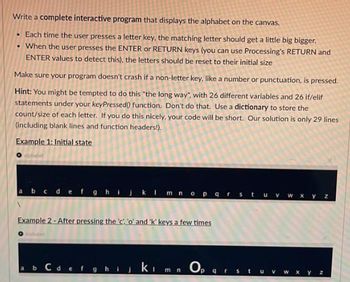
Database System Concepts
7th Edition
ISBN: 9780078022159
Author: Abraham Silberschatz Professor, Henry F. Korth, S. Sudarshan
Publisher: McGraw-Hill Education
expand_more
expand_more
format_list_bulleted
Question
thumb_up100%

Transcribed Image Text:Write a complete interactive program that displays the alphabet on the canvas.
• Each time the user presses a letter key, the matching letter should get a little big bigger.
• When the user presses the ENTER or RETURN keys (you can use Processing's RETURN and
ENTER values to detect this), the letters should be reset to their initial size
Make sure your program doesn't crash if a non-letter key, like a number or punctuation, is pressed.
Hint: You might be tempted to do this "the long way", with 26 different variables and 26 if/elif
statements under your keyPressed() function. Don't do that. Use a dictionary to store the
count/size of each letter. If you do this nicely, your code will be short. Our solution is only 29 lines
(including blank lines and function headers!).
Example 1: Initial state
alphabet
abcdefgh
I m n o p q r s t u v w x y z
Example 2-After pressing the 'c' 'o' and 'k' keys a few times
a b c d e f g h i j kim Op
mn
W X
yz
Expert Solution
This question has been solved!
Explore an expertly crafted, step-by-step solution for a thorough understanding of key concepts.
Step by stepSolved in 4 steps with 3 images

Knowledge Booster
Learn more about
Need a deep-dive on the concept behind this application? Look no further. Learn more about this topic, computer-science and related others by exploring similar questions and additional content below.Similar questions
- Modify the Dice Poker program from this chapter to include any or all of the following features: 1- Splash Screen. When the program first fires up, have it print a short introductory message about the program and buttons for "Let's Play" and "Exit." The main interface shouldn't appear unless the user se- lects "Let's Play." 2-Add a "Help" button that pops up another window displaying the rules of the game (the payoffs table is the most important part). 3-Add a high score feature. The program should keep track of the 10 best scores. When a user quits with a good enough score, he/she is invited to type in a name for the list. The list should be printed in the splash screen when the program first runs. The high-scores list will have to be stored in a file so that it persists between program invocations.arrow_forwardWrite a program that will use WheelsFX shapes to create a Car. There is a size requirement; the Car should fit inside the box that appears on the start-up program. You will be able to change or refine your car over the next several assignments if you so choose. Be creative, your Car can also be something purely out of your imagination if you so choose. Pick one of your shapes. In English, what will you need to do to take it from the default that we get when we create the shape to what you need to build that part of your Car? Now take the shape that you wrote out in question 2 and now write what the Java code would be. Pretend that you were writing this program in C++ instead of Java. Take the code you wrote in question three and now re-write it to look like it would in C++. For the object, you must use a pointer variable. Looking at your answers for questions three and four, what differences do you see syntactically? What does this mean going forward for other objects we work with? The…arrow_forwardThis method returns a string where a triangle appears on the left size of the diagram, followed by horizontal lines. For example calling DrawingApp.getFlag(9, ‘R’, ‘.’, ‘Y’); will generate the stringarrow_forward
arrow_back_ios
arrow_forward_ios
Recommended textbooks for you
 Database System ConceptsComputer ScienceISBN:9780078022159Author:Abraham Silberschatz Professor, Henry F. Korth, S. SudarshanPublisher:McGraw-Hill Education
Database System ConceptsComputer ScienceISBN:9780078022159Author:Abraham Silberschatz Professor, Henry F. Korth, S. SudarshanPublisher:McGraw-Hill Education Starting Out with Python (4th Edition)Computer ScienceISBN:9780134444321Author:Tony GaddisPublisher:PEARSON
Starting Out with Python (4th Edition)Computer ScienceISBN:9780134444321Author:Tony GaddisPublisher:PEARSON Digital Fundamentals (11th Edition)Computer ScienceISBN:9780132737968Author:Thomas L. FloydPublisher:PEARSON
Digital Fundamentals (11th Edition)Computer ScienceISBN:9780132737968Author:Thomas L. FloydPublisher:PEARSON C How to Program (8th Edition)Computer ScienceISBN:9780133976892Author:Paul J. Deitel, Harvey DeitelPublisher:PEARSON
C How to Program (8th Edition)Computer ScienceISBN:9780133976892Author:Paul J. Deitel, Harvey DeitelPublisher:PEARSON Database Systems: Design, Implementation, & Manag...Computer ScienceISBN:9781337627900Author:Carlos Coronel, Steven MorrisPublisher:Cengage Learning
Database Systems: Design, Implementation, & Manag...Computer ScienceISBN:9781337627900Author:Carlos Coronel, Steven MorrisPublisher:Cengage Learning Programmable Logic ControllersComputer ScienceISBN:9780073373843Author:Frank D. PetruzellaPublisher:McGraw-Hill Education
Programmable Logic ControllersComputer ScienceISBN:9780073373843Author:Frank D. PetruzellaPublisher:McGraw-Hill Education

Database System Concepts
Computer Science
ISBN:9780078022159
Author:Abraham Silberschatz Professor, Henry F. Korth, S. Sudarshan
Publisher:McGraw-Hill Education

Starting Out with Python (4th Edition)
Computer Science
ISBN:9780134444321
Author:Tony Gaddis
Publisher:PEARSON

Digital Fundamentals (11th Edition)
Computer Science
ISBN:9780132737968
Author:Thomas L. Floyd
Publisher:PEARSON

C How to Program (8th Edition)
Computer Science
ISBN:9780133976892
Author:Paul J. Deitel, Harvey Deitel
Publisher:PEARSON

Database Systems: Design, Implementation, & Manag...
Computer Science
ISBN:9781337627900
Author:Carlos Coronel, Steven Morris
Publisher:Cengage Learning

Programmable Logic Controllers
Computer Science
ISBN:9780073373843
Author:Frank D. Petruzella
Publisher:McGraw-Hill Education